Leagioan News Agencies
-

Leagioan General Election Results: National Congress Results
The results of the highly anticipated 2024 Leagioan General Election are in, and they signal significant changes for the nation’s political landscape. Voter turnout reached a remarkable 83.6%, with 40,435,484 votes cast, reflecting the widespread engagement of citizens eager to shape the future of their country. This election decided the composition of the House of Councilors and renewed half of the Senate, with implications for the country’s legislative priorities and leadership.
House of Councilors Results
The Social-Progressives' significant gain of 64 seats from the United Peoples Front over the past two years highlights a dramatic shift in Leagio’s political alignment. Analysts attribute this success to several factors. First, the Social-Progressives capitalized on a wave of public dissatisfaction with the United Peoples Front’s internal divisions and inability to present a cohesive policy platform since the 2022 election. Second, the PAP’s strong emphasis on economic reform, climate action, and progressive taxation resonated with middle-class and younger voters who sought tangible solutions to pressing issues.
Additionally, the PAP leveraged its leadership’s strong public image and effective communication strategies to build trust among undecided voters. The decline of the UPF’s appeal was exacerbated by controversies within the alliance, including disagreements between the Socialist Union Party and the Green Party over energy policies, which alienated environmentally conscious voters. As a result, many traditional UPF supporters and first-time voters that supported them in 2022 shifted their allegiance to the Social-Progressives, who presented a united front with clear policy goals on the environment especially.
The election for the House of Councilors, determined through district-level proportional representation using the D’Hondt method, resulted in a significant reshuffling of seats. The new composition and corresponding vote counts are as follows:
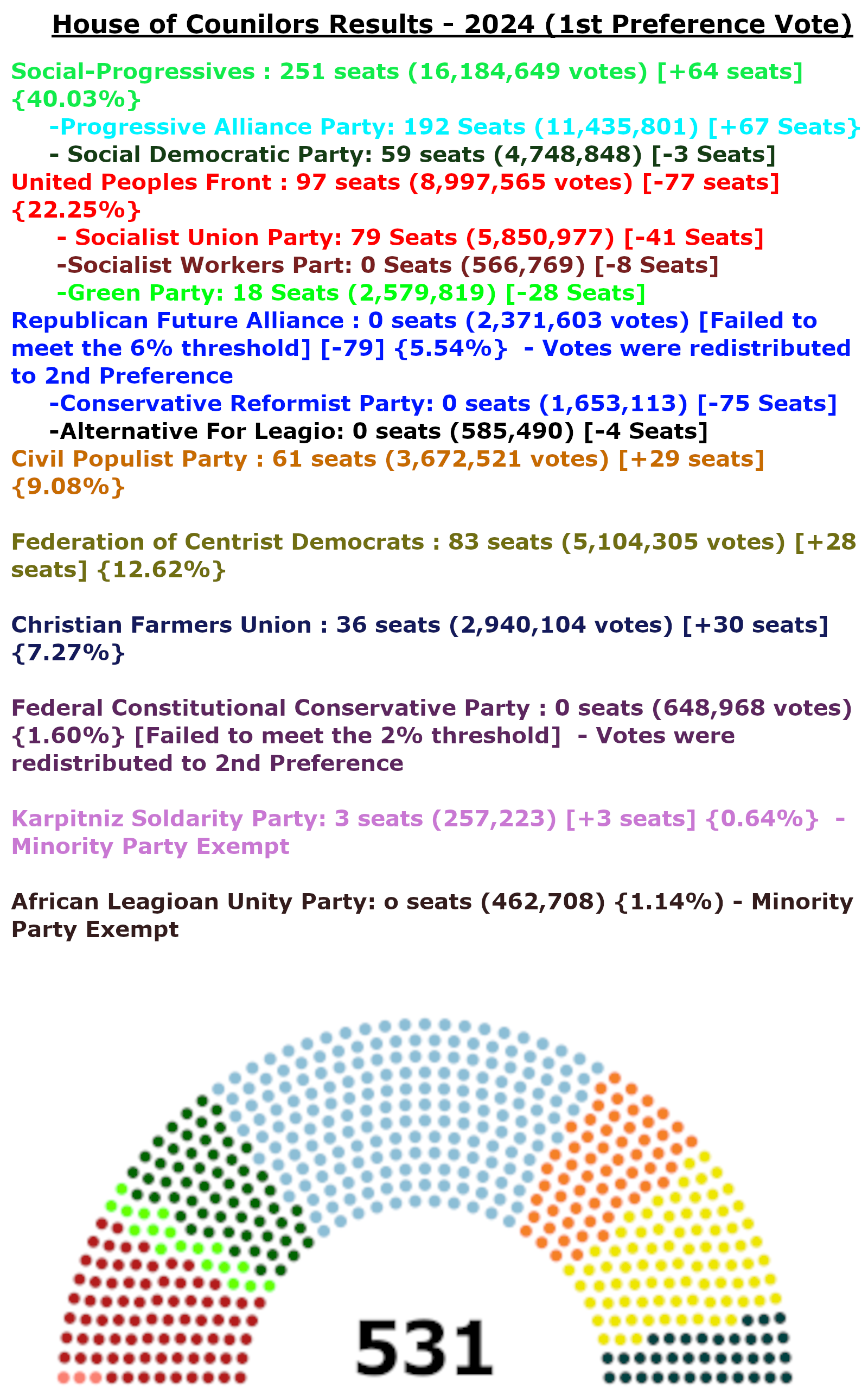
The Social-Progressives emerged as the dominant alliance, significantly increasing their seat count. Meanwhile, the United Peoples Front experienced a sharp decline, and the Republican Future Alliance failed to secure representation due to not meeting the required 6% threshold for alliances.
This election also marks a historic shift in Leagio’s political history. For the first time since the founding of the Commonwealth in 1904, an "Old Guard" party, the Conservative Reformist Party, failed to gain representation in the House of Councilors. As one of the founding pillars of Leagio’s democracy, the Conservative Reformist Party’s consistent presence in the legislature symbolized stability and continuity. However, their inability to meet the 6% threshold within the Republican Future Alliance reflects the party’s diminished influence and the electorate’s demand for more contemporary platforms. This development underscores the evolving nature of Leagio’s democracy, where legacy and tradition must now contend with changing voter priorities and a new generation of political movements.
Another significant outcome of the election is the historic entry of the Karpitniz Sodality Party (KSP) into the House of Councilors. Representing the rights and interests of ethnic minorities in Leagio, the KSP has become the first minority rights party to gain representation in the House. This milestone was achieved due to the exemption of minority parties from the electoral percentage thresholds, which allowed the KSP to secure three seats from the Karpitniz At-Large District where most of their voter base is located where they had over 30% of the vote in said district. Advocates for minority representation have hailed this as a breakthrough, emphasizing the importance of giving underrepresented communities a voice in national politics. Political analyst Janae Krupnik noted, "The KSP’s success demonstrates the inclusivity of Leagio’s political system and the growing recognition of diversity as a cornerstone of democracy."
Senate Results
The Senate elections, conducted through a statewide Single Transferable Vote (STV) system, led to a renewed upper chamber with notable shifts in party representation. The results are as follows:
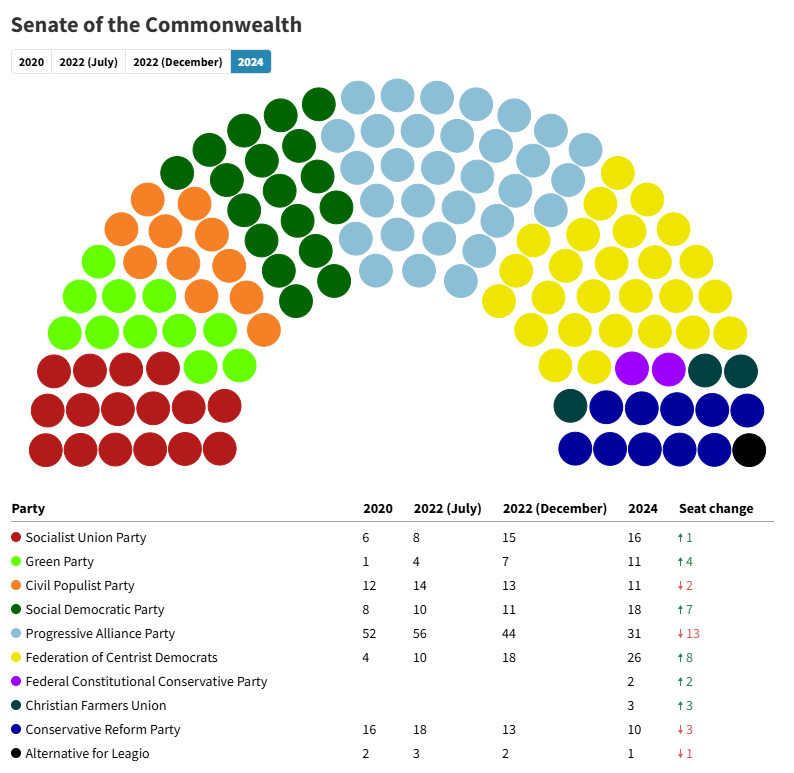
The Progressive Alliance Party remains the largest bloc in the Senate, although it lost several seats. Gains by the Federation of Centrist Democrats and smaller parties like the Green Party and Christian Farmers Union signal a shift in voter priorities.
Coalition Possibilities in the House of Councilors
Although the Social-Progressives and United Peoples Front have cooperated over the past two years, several factors make a renewed coalition between these two blocs unlikely. First, the significant power imbalance following this election—with the Social-Progressives holding 251 seats compared to the UPF’s 97—has created tensions. Many within the Social-Progressives argue that they no longer need to compromise with the UPF, particularly given their expanded mandate and ability to form a majority with other parties.
Second, policy differences that were previously managed under a shared agenda have widened. Disagreements over energy policy, especially between the Socialist Union Party and the Progressive Alliance Party, have created friction as the Socialist Union Party had wanted to shift to nuclear energy for the still on-going gaps of energy supply within the Commonwealth. The UPF’s called for more radical wealth redistribution this election cycle that also clashed with the Social-Progressives’ approach of balancing progressive taxation with market-driven reforms that was developed through the coalition government that they had since 2022.
Finally, the Social-Progressives’ gains largely came at the expense of the UPF, intensifying rivalry between the two blocs. Some UPF leaders view the Social-Progressives’ aggressive campaign strategies as divisive, further straining relations. This electoral dynamic has left little trust between the two groups, making a coalition increasingly unviable.
With 531 seats in the House of Councilors, a coalition requires at least 266 seats to secure a majority. Given the election results, the Social-Progressives have several options to form a government while partnering with only one other party:
Social-Progressives and Civil Populist Party:
- A coalition between the PAP (251 seats) and the Civil Populist Party (61 seats) would result in 312 seats. This partnership could focus on progressive reforms and addressing infrastructure development while maintaining a centrist appeal.
Social-Progressives and Federation of Centrist Democrats:
- Partnering with the Federation of Centrist Democrats (83 seats), the PAP and SDP could secure 334 seats. This coalition would combine progressive and classical liberal approaches, fostering an agenda centered on economic growth and social equity.
Social-Progressives and Christian Farmers Union:
- A coalition between the PAP (251 seats) and the Christian Farmers Union (36 seats) would result in 287 seats, just over the majority threshold. This partnership would likely focus on rural development, agricultural subsidies, and moderate reforms.
These coalitions reflect the versatility of the Social-Progressives’ position as the largest bloc and their ability to negotiate with other parties to achieve legislative goals.
Key Highlights
The 2024 election saw an unprecedented voter turnout of 83.6%, with 40,435,484 votes cast. This high participation level reflects the electorate’s keen interest in shaping the country’s future. Analysts credit this surge to intense campaigns, high-stakes issues like economic reform, and the public’s growing trust in the democratic process. Dr. Alina Moretti, a political scientist at the University of Muale, commented, "Such a high turnout is a testament to the vibrancy of Leagio’s democracy. It demonstrates that citizens are deeply invested in the direction their nation is taking."
The Conservative Reformist Party (CRP), one of Leagio’s founding "Old Guard" parties, faced a historic defeat as its recent shift further to the right alienated its voter base. Many conservative voters turned to the Federation of Centrist Democrats (FCD) and the Christian Farmers Union (CFU), both of which advocate for more moderate and pragmatic policies. Dr. Kenneth Laroche, an expert on conservative movements at the University of the Commonwealth, stated, "The CRP’s inability to adapt to modern political expectations and its increasingly rigid stance pushed voters toward parties that offer a balanced conservative approach. As expected back in the begining of the year and as Former President Lifejumper annicpated CRP's voters were dissillusioned with the Conservative Reformist Party's establishment's idea of shifting to a more right-wing stance on issues, with some members (like now Former Councilor Micky Gates of Huttson) of the CRP suggesting a full-scale invasion on Elthize to resolve the border crisis and have more access to the sea."
Leagio’s proportional representation system, with its 2% threshold for individual parties and 6% for alliances, played a critical role in shaping the election outcome. While these thresholds ensured representation for a broad spectrum of ideologies, they also highlighted the strategic importance of alliances. Parties that failed to adapt to this system, such as the CRP, were effectively sidelined, reinforcing the system’s influence on Leagio’s political evolution. Election analyst Thomas Eryks remarked, "The proportional system is a double-edged sword. It encourages collaboration but punishes those who fail to broaden their appeal." In addition, this election marked a breakthrough for gender representation in Leagio’s political institutions. A record number of women were elected to both the House of Councilors and the Senate. Female leaders were pivotal in shaping their parties’ platforms and campaigns, reflecting a broader societal shift towards gender equity and inclusive leadership. 40% of the newly elected members in both houses of the National Congress were women. Social commentator Elena Vilborg noted in her podcast called The Momentum this afternoon, "This election highlights the progress Leagio has made in dismantling barriers for women in politics. Representation matters, and these results are a significant leap forward."
The Social-Progressives consolidated their position as the dominant force in Leagio’s political scene, gaining 64 additional seats in the House of Councilors. However, their success contrasts sharply with the decline of the United Peoples Front, which lost 77 seats. This realignment has redefined the balance of power, with centrists like the FCD and CFU emerging as key players in coalition-building efforts. Political strategist Marianne Duval (who was part of Former's President Lifejumper's political campaigns for president) stated, "The rise of centrists as kingmakers shows that voters are craving pragmatic governance that bridges ideological divides. It might be expected that the PAP and SDP will either have to continue with the UPF on a coalition which might not be possible this season with the recent results or one of the other centrist parties like the FCD, CFU, or even CPP (although there might be some hesitation on the PAP & SDP's part when remembering 21/22's deadlock)" No comment was made by President of UPF and recently elected Senator James Moriarty at this moment, but the sense from some members of the alliance that lost re-election is that the new election system that the alliance developed with Mouri-Kudo had contributed greatly to their heavy loss of seats and it might possibly be reflective of the overall mood of the entire socialist alliance at the moment. However, time will tell as the talks to form a new coalition government will begin most likely next week when the full results of the election are possibly understood between all of the political parties thatr contested the elections.
As coalition talks will unfold soon in the coming days and weeks, Leagio eagerly anticipate the announcement of the new Prime Minister and cabinet. The incoming government will face pressing challenges, including addressing economic inequality, navigating the Elthize border situation that caused problems within the National Congress calling for aggressive foreign policy even though the Elthize government argued that they are within the rights to do so through the provisions of the Tullion Agreement back in 1982, refining national security policies, and on-going political reform that is still desperately needed. When celebrating the success of the Social-Progressive's increase of seats, the alliance's candidate for Prime Minister Revy Robertson was quoted in saying that "[her administration, once selected,] will work to cool down tensions within the branches of the Leagioan government and allow the Elthize government do what they feel is necessary on the matter as long as the lines of communication between to the two governments about the matter remain strong and supportive to their own needs."
It is expected that soon that the results for both the Presidential and Governor-General Election will be announced and called for with a victory as the votes for the two races are being counted at the moment.
-

2024 Leagioan Presidential Election: A Resounding Mandate for Ran Mouri-Kudo
The 2024 Presidential Election in the Commonwealth of Leagio concluded its first round with historic results that reflect the nation’s evolving political dynamics. With an impressive voter turnout of 80.6%, citizens decisively participated in shaping the future of their country. The election was notable not only for the high turnout but also for the clear first-round victory of the incumbent, President Ran Mouri-Kudo, representing the Progressive Alliance Party (PAP) and the Social-Progressives (SP). This article delves into the details of the election, the candidates’ performances, and the implications for Leagio’s political future.
First-Round Results

President Ran Mouri-Kudo’s decisive victory marks the first time in recent Leagioan history that an incumbent has won outright in the first round by surpassing the 50% threshold. This achievement underscores widespread public approval of her administration’s handling of key issues, including economic recovery, progressive taxation, and social equity initiatives. Her strong support base cut across urban centers, younger demographics, and progressive constituencies.
Mary Scott of the Socialist Union Party (SUP) emerged as the second-place candidate with over 25% of the vote. Representing the United Peoples Front (UPF), Scott’s platform emphasized wealth redistribution, enhanced public services, and worker rights. While her policies resonated with urban working-class districts and left-leaning voters, the UPF’s internal divisions and recent loss of seats in the House of Councilors likely weakened her broader appeal.
Alex Barbier, representing the Federation of Centrist Democrats (FCD), secured a notable 17.9% of the vote. His focus on market-driven policies, individual liberties, and a balanced approach to governance appealed to middle-class and moderate voters. Barbier’s performance signals the rising influence of centrist politics in Leagio and a growing demand for pragmatic solutions to national challenges.
Mucker Parlson of the Conservative Reformist Party (CRP), representing the Republican Future Alliance (RFA), garnered only 6.7% of the vote. This dismal performance reflects the CRP’s continuing decline in relevance and voter trust. The party’s recent rightward shift and failure to modernize its platform have alienated traditional supporters, many of whom have migrated to more moderate conservative options like the FCD and the Christian Farmers Union (CFU).
The 80.6% voter turnout is a testament to the electorate’s engagement and the high stakes of this election. Analysts credit this surge to increased political awareness, the pressing nature of economic and social issues, and competitive campaigns by all major candidates.
The President’s campaign focused heavily on her administration’s achievements, including job creation, infrastructure investment, and healthcare reforms. Her ability to communicate a clear and forward-looking vision for Leagio resonated with voters, particularly in urban centers and among young professionals. Her personal charisma and approachable demeanor further solidified her appeal.
While Mary Scott and Alex Barbier presented compelling platforms, they were unable to overcome the momentum of the incumbent. The UPF’s internal conflicts and lack of a unified message hindered Scott’s chances, while Barbier’s campaign, though promising, struggled to break beyond centrist and suburban voter bases. Mucker Parlson’s campaign, plagued by the CRP’s diminishing relevance, failed to gain significant traction.
With over 50% of the vote, President Ran Mouri-Kudo has received a resounding mandate to continue her administration’s policies. This result provides her government with the political capital to tackle pressing issues, including economic inequality, climate change, and social equity. The clear support from urban centers and progressive constituencies gives her administration the opportunity to double down on ambitious infrastructure projects, renewable energy investments, and expanded access to healthcare.
The election results reveal significant challenges for the opposition. The UPF must address its internal divisions, particularly between the Socialist Union Party and the Green Party, which have often clashed over priorities like energy policy and wealth redistribution. Meanwhile, the FCD’s promising performance highlights the potential for centrists to emerge as a dominant force, but it will require a broader coalition to challenge the dominance of the SP. The CRP’s disastrous showing emphasizes the urgency of modernizing its platform and reconnecting with disillusioned conservative voters.
The regional and demographic distribution of votes highlights a shift in Leagio’s political landscape. The election has solidified the Social-Progressives’ dominance in urban areas and among younger voters, while also exposing vulnerabilities in rural regions and among older demographics. These dynamics will shape the strategies of all major parties moving forward.
Minority communities played a pivotal role in securing Ran Mouri-Kudo’s victory. The growing influence of minority rights advocacy groups and their alignment with progressive platforms suggests that future elections will see a continued emphasis on inclusivity and representation. This could lead to more policy-driven initiatives addressing systemic disparities.
The election’s outcome also has implications for Leagio’s foreign policy. President Mouri-Kudo’s strong mandate may allow her administration to pursue deeper economic and political alliances with neighboring countries while continuing to advocate for multilateral solutions to global challenges, such as climate change and trade.
Ran Mouri-Kudo dominated in urban areas, particularly in major cities like Tervali and Eltebena. Her administration’s policies on affordable housing, public transportation, and urban renewal resonated strongly with city dwellers. Additionally, her focus on progressive taxation and social programs appealed to middle-class professionals and working-class families alike. Urban districts with high concentrations of younger voters gave her overwhelming support, with some districts reporting over 60% of the vote in her favor.
Suburban voters leaned toward Alex Barbier, reflecting their preference for centrist policies focused on economic stability and personal liberties. Suburbs with a mix of middle-income families and small business owners demonstrated strong support for the FCD’s market-driven approach and balanced governance, though they did not achieve enough support to challenge the SP’s dominance.
Mary Scott performed relatively well in rural areas, particularly in agricultural regions where her policies on farming subsidies and workers’ rights found support. However, these gains were not enough to significantly challenge the Social-Progressives, whose rural outreach efforts emphasized renewable energy projects and rural healthcare access.
Ethnic minorities and marginalized groups provided crucial support for Ran Mouri-Kudo, particularly in diverse districts where her administration’s emphasis on social equity and minority representation struck a chord. Communities that historically felt excluded from the political process turned out in large numbers, helping to secure key districts.
In industrial and manufacturing hubs, the results were more mixed. While the Social-Progressives gained traction by highlighting their investment in infrastructure and clean energy transitions, Mary Scott’s calls for stronger union protections also resonated with blue-collar workers. These areas remain competitive battlegrounds for future elections.
Connection to the National Congress Elections
The 2024 Presidential Election results are deeply interconnected with the recently concluded National Congress elections, which shaped the composition of both the House of Councilors and the Senate. The Social-Progressives (SP) not only secured a commanding majority in the House of Councilors but also maintained significant influence in the Senate. This alignment between the executive and legislative branches places the SP in a pivotal position to implement its policy agenda with minimal obstruction.
Under Leagio’s constitutional framework, the President holds the authority to nominate a candidate for Prime Minister to the House of Councilors, making this a critical juncture in the government formation process. Given the Social-Progressives’ dominance in the House, President Ran Mouri-Kudo’s nomination is expected to reflect her party’s leadership and vision. Revy Robertson, the SP’s candidate for Prime Minister, is the likely nominee. As a well-respected figure within the party, Robertson’s nomination would signal continuity in progressive policies and reinforce the administration’s commitment to addressing key national challenges.
The synergy between the President and the SP-controlled National Congress provides a rare opportunity for cohesive and decisive governance. Key legislative priorities such as economic reform, renewable energy initiatives, and expanded healthcare access are expected to move forward without significant delays. This alignment also enables President Mouri-Kudo to pursue ambitious policies that require close cooperation between the executive and legislative branches, such as comprehensive tax reforms and rural infrastructure investments.
However, this concentration of power also places immense pressure on the SP to deliver tangible results. Opposition parties, including the Federation of Centrist Democrats (FCD) and the Socialist Union Party (SUP), are likely to scrutinize the government’s actions closely, leveraging their influence in the Senate and public discourse to hold the administration accountable.
Although the Social-Progressives (SP) emerged as the dominant force in the House of Councilors with 251 seats, they fall short of the 266-seat threshold required for an outright majority. This means that President Ran Mouri-Kudo and her political alliance must negotiate a coalition to ensure effective governance and smooth passage of legislative priorities.
The SP’s most likely coalition partners include the Civil Populist Party (CPP) with 61 seats and the Christian Farmers Union (CFU) with 36 seats. Both parties share overlapping interests with the SP on key issues, such as infrastructure development, rural healthcare access, and renewable energy initiatives. However, coalition negotiations are likely to involve compromises on contentious policies, including the scale of progressive taxation and social welfare programs.
Another potential partner is the Karpitniz Sodality Party (KSP), a minority rights party with three seats. While their small seat count does not significantly alter the balance of power, their inclusion could bolster the administration’s commitment to inclusivity and representation. Securing the KSP’s support could also reinforce President Mouri-Kudo’s appeal to minority communities, which were pivotal in her presidential victory.
Failure to secure a coalition could lead to legislative gridlock, forcing the SP to rely on issue-based alliances with smaller parties or independent councilors. This scenario would complicate the administration’s ability to enact comprehensive reforms and could strain its relationship with the broader electorate.
Despite the SP’s majority, coalition dynamics and regional interests could pose challenges. Smaller parties such as the Christian Farmers Union (CFU) and minority rights groups like the Karpitniz Sodality Party (KSP) may push for specific policy concessions in exchange for their support on contentious issues. Balancing the interests of diverse constituencies while maintaining a unified legislative agenda will be a key test for the administration.
This election cycle highlights a significant shift in Leagio’s political landscape, with the electorate favoring progressive and centrist policies over far-right or radical alternatives. The decline of the Republican Future Alliance (RFA) and the Conservative Reformist Party (CRP) reflects a growing demand for pragmatic governance that prioritizes inclusivity and economic stability. Meanwhile, the rise of minority representation through parties like the KSP underscores the evolving nature of Leagio’s democracy, where diverse voices are increasingly recognized and empowered.
The alignment of the presidency and the National Congress under the Social-Progressives creates a unique opportunity to drive meaningful change. However, it also raises expectations for effective governance and the ability to address the pressing needs of Leagio’s citizens. As President Ran Mouri-Kudo and her administration move forward for another 4 years, the balance between ambition and pragmatism will determine the success of this new political era.
-

President Mouri-Kudo Attends Christmas Charity Ball Following Resounding Election Victory
In a display of unity and festivity, President Ran Mouri-Kudo was seen attending the prestigious Christmas Charity Ball held in the capital, Tullion, just days after her landslide re-election victory. The event, known for bringing together the nation's political and social elite, provided a jubilant backdrop to celebrate the holiday season while raising funds for several charitable organizations across the Commonwealth of Leagio.
President Mouri-Kudo, dressed in an elegant crimson gown adorned with subtle golden accents, made a grand entrance that captivated attendees. Her appearance at the event was seen as a gesture of gratitude and solidarity, following her recent electoral success that granted her a renewed mandate to lead the nation for the next term. The president mingled with guests, emphasizing the importance of national unity and the spirit of giving during her brief remarks to the audience.
“As we celebrate this season of joy and generosity, let us remember the strength that comes from standing together as one nation. Tonight is a testament to what we can achieve when we come together to support those in need,” President Mouri-Kudo remarked. She also expressed her gratitude to the event organizers and attendees for their contributions to causes ranging from child welfare to environmental conservation.
The ball was notable for the presence of Councilor-Elect Kenith Lifejumper, the former President of the Commonwealth (2015-2021) and leader of the Federation of Centrist Democrats (FCD). Lifejumper, who will soon take his place in the House of Councilors, was seen engaging in lively conversations with other political leaders and dignitaries. His attendance highlighted the cross-party camaraderie that characterized the evening.
Dressed in a sharp navy tuxedo, Lifejumper congratulated President Mouri-Kudo on her electoral victory, calling it a “clear endorsement of her vision for Leagio.” He also used the occasion to discuss his plans as Councilor, particularly his commitment to fostering bipartisan cooperation in the National Congress.
The Christmas Charity Ball was marked by its signature blend of elegance and philanthropy. Guests were treated to performances by renowned Leagioan musicians and a gourmet dinner curated by celebrated chefs. The highlight of the evening was the charity auction, which raised millions of Leagioan Sulia's for various charitable initiatives. Both President Mouri-Kudo and Councilor-Elect Lifejumper participated in the auction, with the president winning a handcrafted Karpitniz tapestry symbolizing unity and resilience.

Dr. Helena Moore, a political analyst and professor at Tullion University, noted the symbolic significance of the ball. “This event highlighted the potential for a new era of cooperation in Leagioan politics. The president’s willingness to engage with leaders from across the spectrum, including Lifejumper, demonstrates a strategic approach to governance that prioritizes unity over division,” she remarked.Marion Dupree, a charity organizer who attended the ball, shared her thoughts on the president’s presence. “President Mouri-Kudo’s speech was incredibly inspiring. She has a way of connecting with people and making them feel like their contributions matter,” Dupree said. “Having Councilor-Elect Lifejumper there was also a powerful reminder that, despite political differences, our leaders can come together for a greater cause.”
Jorge Linz, a veteran journalist from DLN who covered the event, remarked on the growing speculation about a coalition. “The chemistry between President Mouri-Kudo and Councilor-Elect Lifejumper did not go unnoticed. Their shared priorities, such as healthcare and infrastructure, could very well set the stage for an SP-FCD coalition in the National Congress. If they manage to overcome their ideological differences, this could be a game-changer for Leagio,” Linz explained.
The presence of both President Mouri-Kudo and Councilor-Elect Lifejumper at the same event has fueled speculation about the potential for increased collaboration between the Progressive Alliance and the Federation of Centrist Democrats. While the two leaders represent distinct political ideologies, their shared commitment to advancing Leagio’s prosperity was evident throughout the evening.
This speculation has grown louder in political circles as the possibility of a coalition government between the Social-Progressives (SP) and the Federation of Centrist Democrats (FCD) gains traction. With the 1st session of the newly elected National Congress set to convene in early January, analysts have noted that the alignment of priorities, such as economic growth, social equity, and fostering national unity, could serve as a foundation for such a partnership. Observers have pointed out that a coalition could stabilize the political landscape and bring a fresh dynamic to governance, blending progressive ideals with centrist pragmatism.
Discussions surrounding the potential coalition have also highlighted specific areas of potential agreement. Both parties have expressed interest in strengthening Leagio’s healthcare system, expanding renewable energy projects, and addressing regional disparities in infrastructure. Moreover, such a partnership could signal a shift towards more inclusive governance, leveraging the political acumen of both Mouri-Kudo and Lifejumper to enact wide-reaching reforms. However, challenges remain, particularly regarding differing approaches to taxation policy and social programs, which some critics argue could lead to friction within the coalition.
Supporters of the idea argue that this coalition could lead to bold reforms and effective policymaking, while critics caution that ideological differences might pose challenges to such an alliance. Both President Mouri-Kudo and Councilor-Elect Lifejumper have thus far remained tight-lipped about any formal discussions, but their visible camaraderie at the ball has left the public and media speculating about the future direction of Leagio’s government.
As the nation prepares to usher in a new year, the Christmas Charity Ball served as a powerful reminder of the values that bind Leagioans together—generosity, unity, and hope for the future.
-

Social-Progressives and Centrist Democrats Reach Coalition Agreement For 2025-2029
In a historic moment for the Commonwealth of Leagio, the Social-Progressives (SP) and the Federation of Centrist Democrats (FCD) have finalized a coalition agreement to govern the nation. The agreement announced in a joint press meeting by President Ran Mouri-Kudo (who recently won a second term anhd President of the Social-Progressives political alliance) and Councilor-elect Kenith Lifejumper (President of the Federation of Centrist Democrats), which outlines a shared vision for the next four years [starting on January 14th, 2025], promises economic growth, social equity, and environmental sustainability, while preserving the democratic principles that underpin Leagioan governance.
Key appointments (C means that they currently are or will be a member of the House of Councilors, while S means that they currently are or will be a member of the Senate) include:
-
Prime Minister: Revy Robertson (C) (PAP)
-
Deputy Prime Minister: Kenith Lifejumper (C) (FCD)
-
Minister of Foreign Affairs: Federica Mogherini (C) (PAP)
-
Minister of Education: Lesile Leloup (C) (FCD)
-
Attorney General: Ethel Hearson (C) (SDP)
-
Minister of Defence: German Molinero (S) (FCD)
-
Minister of Health: Dr. Kenzo Tenma (C) (PAP)
-
Minister of Economy and Treasury: Tom Kelly (C) (PAP)
-
Minister of the Interior: Katara Nix (C) (PAP)
-
Minister of Digital Technology: Ramerra Moody (C) (PAP)
-
Minister of Public Works and Transportation: Jullien Treduea (C) (FCD)
-
Minister of the Environment: Ash Knopp (C) (PAP)
-
Minister of Agriculture: Kathleen Wood (C) (SDP)
-
Minister of Cultural Affairs: Victor Nikiforov (C) (PAP)
-
Minister of Social Services: Michael Scott (C) (FCD)
-
Minister of Research: Dr. Ritsuko Akagi (PAP)
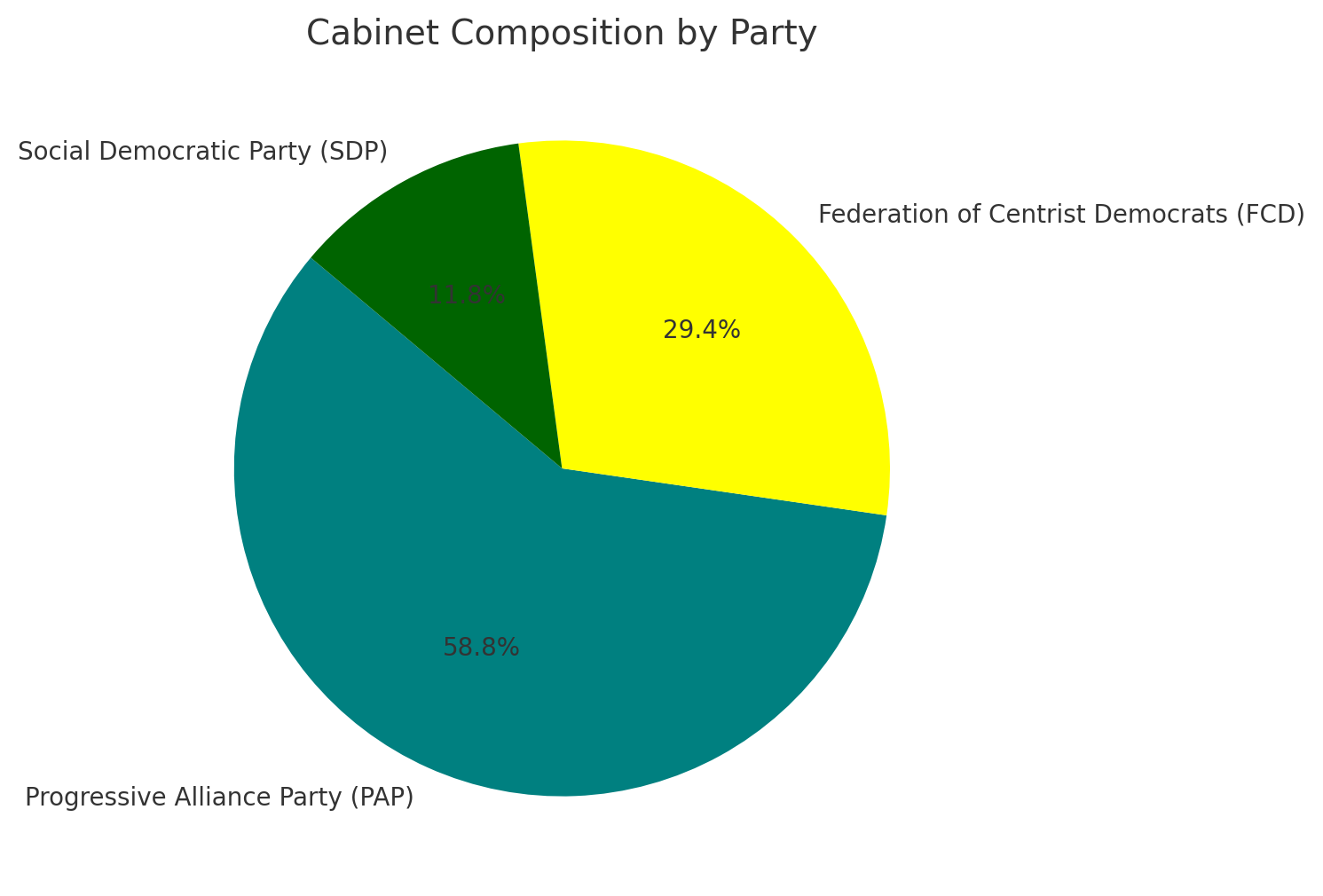
Prime Minister Revy Robertson, a prominent leader of the Progressive Alliance Party (PAP), will helm the coalition, with Kenith Lifejumper of the FCD serving as Deputy Prime Minister. The appointments highlight a commitment to bipartisan cooperation and shared governance with some of the Minister from the previous Lahaye Government on PAP and SDP keeping their positions. Especially with a couple of the FCD ministers are from Lifejumper's Presidency when he was a member of the CPP. Mouri-Kudo negotiating with the FCD on keeping Tom Kelly marks a continuation of her administration's economic platform that will meet some of the critea requirements that aligns to the ecomonic platform of the FCD where the key aspects of the Kudomonic platform will still implementation where power will be given to the state and local governments on ethical bussiness practices with an appeal process that can go to the Supreme Court and Commonwealth Government. The appointment of renown Ice Skater and one of the eight Councilor's representing Arlick's 2nd Congressional District Victor Nikiforov (of the PAP) known for his flamboyant personality and passion for creative expression to Cultural Affairs has been applauded by the artistic community, who hope he will champion increased funding for the arts and cultural preservation. Skeptics question whether his lack of political experience may hinder his ability to navigate government bureaucracy effectively.
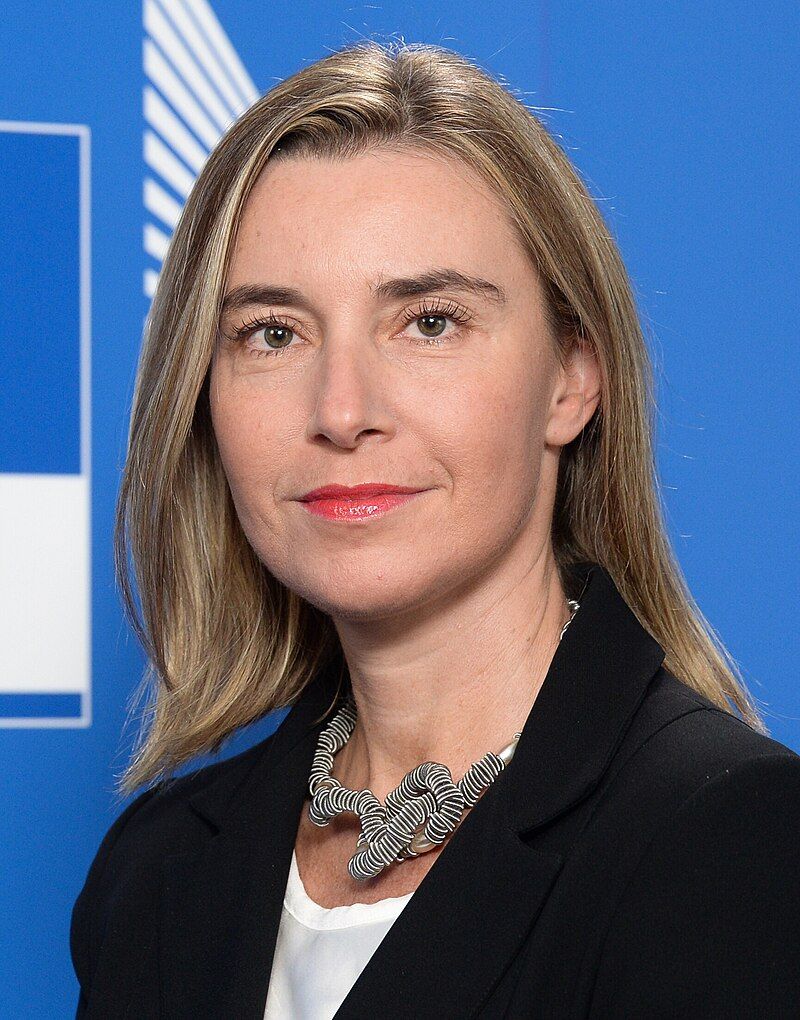
A 2024 campaign photo from the Mogherini for Congress Committee
Another interesting appointment is of Federica Mogherini, who has been part of Mouri-Kudo cabinet and Minister of Foreign Affairs since the first day that Mouri-Kudo was sworn into office. The continuation of having Federica Mogherini as Minister of Foreign Affairs might be a representation that Mouri-Kudo and Prime Minister-Elect Robertson of wanting to maintain the Pro-Telum but Neutralist stance of foreign policy that was a staple of Mouri-Kudo's presidency since the start of her first term. The interesting fact about her as before this election, she was not even a member of the House of Councilors nor the Senate until recently where she ran and won election in Condris's 1st Congressional District. Opposition members, however, argue that Mogherini’s focus on multilateralism could come at the expense of addressing immediate domestic concerns.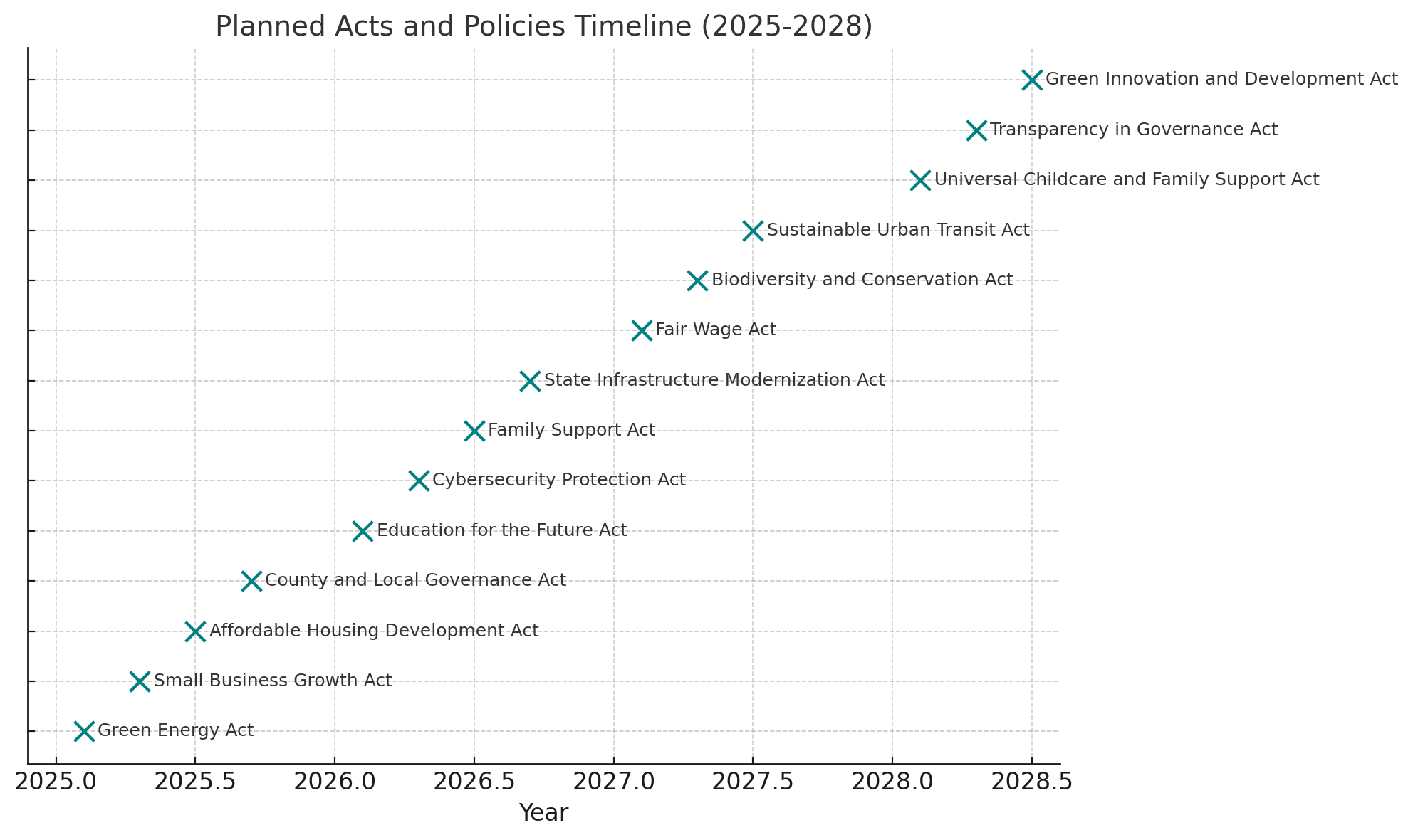
Economic Growth and Support for Families
-
Small Business Growth Act: Tax incentives and reduced regulations for small and medium-sized businesses to drive entrepreneurship and local economic development.
-
Middle-Class Relief Initiative: Tax credits to offset childcare, healthcare, and housing costs for working and middle-class families.
-
Affordable Housing Development Act: Incentivizing sustainable, low-cost housing construction through grants and partnerships.
Social Equity and Public Services
-
Family Support Act: Expanded parental leave policies and childcare subsidies to support working families.
-
Healthcare Reforms: Increased funding for rural healthcare, lower prescription drug costs, and incentives for medical professionals in underserved areas.
-
Education for the Future Act: Prioritizing STEM education and digital literacy to equip students for the modern workforce.
Environmental Responsibility
-
Green Energy Act: Investments in renewable energy projects to achieve a 50% reduction in carbon emissions by 2030 and carbon neutrality by 2040.
-
Biodiversity and Conservation Act: Expanded funding for protected areas and wildlife conservation.
-
Sustainable Urban Transit Act: Development of eco-friendly public transportation systems.
Governance and Decentralization
-
County and Local Governance Act: Establishing elected County Councils to enhance local governance and empower municipalities with greater autonomy over public services and zoning.
-
State Infrastructure Modernization Act: Flexible funding for state governments to address critical infrastructure needs, including roads, utilities, and disaster resilience.
The coalition partners have also committed to improving transparency and accountability in government operations. A new digital platform will provide citizens with real-time access to government spending, decision-making processes, and public services. Anti-corruption laws will be strengthened, and whistleblower protections enhanced under the "Transparency in Governance Act."
President Ran Mouri-Kudo commended the coalition’s efforts, stating in a statement released by her press secretary, "This agreement is a testament to what can be achieved when leaders put aside differences and work together for the good of the nation. The priorities outlined here reflect a deep commitment to the values of equity, innovation, and sustainability that define our great Commonwealth. I look forward to supporting this government as it strives to meet the challenges and opportunities ahead."
Meanwhile, members of the coming opposition that is to be determined which includes the United People's Front (UPF) [the socialist alliance that Mouri-Kudo's party had been in coalition with since 2022], Civil Populist Party (CPP), and Christian Farmers Union (CFU). Although, members of the UPF have been silent at the moment about the announcement of the coalition but some of its members have expressed frustration over the Social-Progressives’ shift toward centrist policies, the president of the alliance and Senator-elect, representing the State of Freedonia within the National Congress, Professor James Moriarty commented at the Elena Vilborg's podcast The Momentum, where he mentioned "by July 2024, there was a noticeable distance of isolation between members of the UPF and SP that was caused by certain members of the Socialist Union Party in the 2nd Lahaye Government wanting to stir up votes in their constituencies and make SP look unable to govern. Personally, I think that this not only caused them to lose their seats this election season but also the Alliance failed get a stronger candidate for Prime Minister that would have been able to rally first-time younger voters to the polls in support of the UPF as we did in 2022. This failure allowed the SP to gain not only about 60 seats from the UPF but also gave Mouri-Kudo the popularity to win the Presidential race with over 50% of the vote in the first round and made her the winner out-right." Professor Moriarty confirmed that the UPF had indeed voted to keep him as its leader not only of the alliance in general outside the Congress but also inside the doors of the Senate within the National Congress.
Senator Maria Kerstin, who was the CPP's candidate for Prime Minister and is the Party's President, was quoted at a press conference that this agreement formed between the Social-Progressives and the Centrist Democrats "lacks specific metrics to measure success, making it difficult to hold the government accountable in front of the electorate that voted them into office." The CPP has expressed concerns over the lack of clear benchmarks for evaluating major initiatives like the upcomming Green Energy Act and Affordable Housing Development Act, warning that the government risks overpromising and underdelivering.
The CFU, which represents centrist agrarian interests, has criticized the coalition’s environmental policies, particularly the Green Energy Act, for potentially harming rural economies. CFU President Elma Wilkins stated: “While we support the move toward renewable energy, this coalition is ignoring the immediate needs of farmers and rural workers who depend on affordable energy and transportation. The government must do more to protect rural livelihoods while pursuing its environmental goals.”
However, members of the Republican Future Alliance were more vocal in their opposition. With the alliance 2024 presidential candidate Mucker Parlson calling the election 'rigged against the common voter of the nation' and went as far to claim that the party was on his side where they have tanken their grievances to the Common Electoral Commission. In addition, outgoing Councilor Ricky Gates commented that it was the work of the socialist and ultraliberal forces that they rigged the system of the election to prevent the RFA in gaining representation within the House of Councilors.
The coalition agreement marks the beginning of a new chapter in Leagioan politics. Analysts project that the combination of fiscal incentives and targeted investments could significantly bolster small business growth, with the potential for a 10% increase in entrepreneurship across rural and urban areas. Furthermore, the transition to renewable energy outlined in the Green Energy Act is estimated to create 50,000 new jobs by 2027, positioning Leagio as a leader in sustainable development. With a clear legislative agenda and a balanced leadership team, the SP-FCD coalition faces the daunting task of turning its vision into reality. As the government takes its first steps, all eyes will be on its ability to foster unity, drive progress, and meet the expectations of the Leagioan people.
-
-

Mouri-Kudo Sworn in for Second Term as President of Leagio

Tullion, January 1, 2025 – In a historic ceremony held in front of the National Congress Building in Tullion, Ran Mouri-Kudo (Leader of the Progressive Alliance Party since 2019 and President of the Social-Progressives since 2021) was sworn in today for her second term as President of the Commonwealth of Leagio. Surrounded by members of the National Congress, dignitaries, and thousands of citizens who gathered to witness the event, President Mouri-Kudo reaffirmed her commitment to the principles of democracy, freedom, and progress.
The inauguration ceremony began with a formal address by the Speaker of the House of Councilors (her husband Shinichi Mouri-Kudo), who highlighted the achievements of the first term, including economic reforms, advancements in education, and strengthened international relations. President Mouri-Kudo then took the oath of office, as prescribed by the Constitution, swearing to uphold and protect the rights and freedoms of all Leagioans.
In her inaugural speech, President Mouri-Kudo outlined the vision for her second term, focusing on fostering economic growth, addressing climate change, and enhancing the Commonwealth's role in global diplomacy. “Today, we reaffirm our unity as a diverse and thriving nation,” she said. “We will continue to build a Commonwealth where every citizen can achieve their dreams.” The event featured performances by Leagioan artists and a military parade showcasing the nation’s commitment to peace and security. Leaders from across the political spectrum, including Prime Minister Marie-Laura Lahaye (whose government is expected to continue until January 14th, where the new session of the National Congress will begin) and members of the opposition, attended the ceremony, underscoring the bipartisan respect for the democratic process.
Mouri-Kudo's second term begins with significant challenges, including implementing the recently passed national budget format that was established last year to divide the budget by ministry and managing evolving geopolitical dynamics. However, her administration enters this term buoyed by strong public support and a renewed mandate to lead the Commonwealth of Leagio.
-

New Foreign Agreement between Leagio and California Established
The Commonwealth of Leagio and the Commonwealth of California have formally announced the signing of the Westwood Accord, a landmark agreement set to redefine diplomatic, educational, and economic relations between the two nations. The agreement comes in response to a summit visit that President Mouri-Kudo had with Prime Minister Kamala Harris, where the two leaders discussed various topics of international politics and personal interests; including with Prime Minister Harris attending the second inauguration of Mouri-Kudo back in January 1st. This historic pact, reached after extensive negotiations, signals a new chapter of cooperation and mutual growth.
The Westwood Accord includes several groundbreaking provisions:
-
Establishment of Diplomatic Relations: Both nations will establish full diplomatic relations, including the opening of embassies in their respective capitals within six months. Ambassadors will be appointed to deepen mutual understanding and foster international cooperation.
-
Education and Research Partnership: The agreement facilitates reduced tuition fees for students participating in exchange programs between Leagio’s University of the Commonwealth and Commonwealth University System campuses and California’s University of California and California State University systems. A bilateral research partnership will also promote joint projects in technology, environmental science, public health, and defense.
-
Economic Collaboration: A semiconductor manufacturing initiative will be established in the State of Arlick within Leagio, supported by a major investment program managed by Arlick’s state government. Additionally, California will gain reduced-price access to non-commercial aircraft from Leagio’s Embraer S.A., and Leagioan diamond companies will be welcomed into the Californian market under fair trade principles.
-
Digital Partnership: A comprehensive digital partnership will advance collaboration in areas such as cybersecurity, e-governance, and digital infrastructure. Annual forums will ensure continued progress in these critical sectors.
President Mouri-Kudo of Leagio shared a similar sentiment. “The Westwood Accord represents the strength of diplomacy and partnership. Through this agreement, we are not only creating opportunities for our economies and institutions but also laying the foundation for a relationship built on trust and shared progress.”
Samuel Tudela, the newly elected Minister-Governor of Arlick, who successfully built a PAP-SDP-FCD coalition in the state, also expressed his strong support for the Accord. “This agreement is a game-changer for Arlick. The semiconductor initiative will bring jobs, innovation, and international recognition to our state. I am committed to ensuring that this partnership thrives and benefits not just Arlick, but the entire Commonwealth of Leagio.” His new government was elected during the elections back in December, where the Social-Progressives in Arlick like its National Organization managed to gain many seats in the Arlick State Congress parliament of 260 seats, where they agreed to go into coalition with Federation of Centrist Democrats in Arlick that also gained seats. The Arlick coalition government made the agreement to expand the wealth and industry of the State of Arlick in Leagio
The Accord is scheduled to be ratified by Leagio’s National Congress following the establishment of the newly formed Robertson Government that will take place on January 14th. Discussions are expected to emphasize bipartisan support for the agreement’s broad benefits, from job creation in the semiconductor industry to enhanced educational and cultural exchange programs.
-
-

President Ran Mouri-Kudo Calls for EU-Wide AI Regulation Treaty at Press Conference
Executive Mansion, Commonwealth of Leagio – In a bold and decisive move, President Ran Mouri-Kudo has called for a European Union-wide treaty agreement to regulate the powers and ethical use of artificial intelligence (AI). Speaking at a press conference held at the Executive Mansion, the Leagioan leader emphasized the urgent need for a coordinated European framework to ensure AI development remains ethical, transparent, and beneficial to all citizens.
She stressed that while AI holds great potential to revolutionize industries, its unchecked growth could lead to privacy violations, algorithmic biases, and economic disparities.
"Artificial intelligence is advancing at an unprecedented pace, transforming industries from healthcare to finance and beyond," President Mouri-Kudo stated. "However, with great power comes great responsibility. If we fail to put adequate safeguards in place, AI could exacerbate inequalities, undermine democratic values, and challenge human rights."
The President called on EU leaders to collaborate on drafting a legally binding treaty that would establish clear standards for AI ethics, accountability, and governance. She highlighted the importance of transparency in AI decision-making processes and the need for a framework that prevents misuse by both corporations and governments.
President Mouri-Kudo outlined key principles that she believes should be enshrined in the EU-wide AI treaty, including:
-
Transparency and Accountability: AI developers must be required to disclose how their algorithms function and ensure that AI decision-making is explainable.
-
Data Protection and Privacy: AI applications must comply with strict data security laws to prevent the misuse of personal information.
-
Bias Prevention and Fairness: AI systems must be designed to eliminate racial, gender, and economic biases, ensuring equitable outcomes for all citizens.
-
Ethical AI Use in Employment: Governments must regulate AI-driven automation to protect jobs and prevent mass layoffs.
-
Military and Security Restrictions: AI should not be used for autonomous lethal weapons or mass surveillance that infringes on civil liberties.
-
Human Oversight in Critical Decisions: AI should not be used to make life-altering decisions, such as medical diagnoses or criminal sentencing, without human oversight.
The President reaffirmed Leagio’s own commitment to responsible AI governance, citing the country’s advancements in digital infrastructure and ongoing initiatives to ensure ethical AI use. Under her administration, the Ministry of Digital Affairs and Communications has been working to draft national regulations aligned with broader EU standards. Additionally, Leagio’s government has initiated cross-border partnerships in digital governance and cybersecurity, as outlined in the Westwood Accord signed with the Commonwealth of California. These partnerships aim to strengthen international cooperation on technology-related challenges.
The call for an AI treaty has sparked mixed reactions across the European Union. Supporters of the initiative, including members of the Progressive Alliance Party (PAP) and Green Party (GP) of Leagio, praised the President’s leadership in addressing the pressing issue of AI regulation. However, the Federal Constitutional Conservative Party (FCCP) and Federation of Centrist Democrats (FCD) voiced concerns about potential overregulation, warning that excessive restrictions could stifle innovation and economic growth. Meanwhile, industry leaders have expressed cautious optimism, with some calling for balanced policies that promote both innovation and ethical considerations.
President Mouri-Kudo announced that she will be engaging in diplomatic talks with EU leaders in the coming weeks to push forward discussions on the proposed treaty. She has also requested that the Leagioan Ministry of Foreign and European Affairs draft an initial proposal to be presented at an upcoming EU summit.
"We stand at a crossroads where we can either shape AI for the good of humanity or allow it to be dictated by profit and power," President Mouri-Kudo concluded. "Leagio is ready to lead the charge for responsible AI governance in Europe and beyond."
The global community now watches closely as Leagio positions itself at the forefront of ethical AI governance, signaling a new era of digital responsibility in European policymaking.
-
-
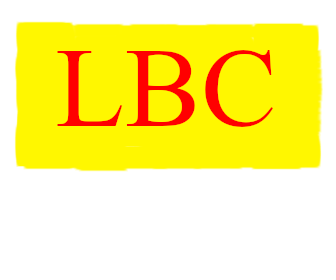
1st Robertson Coalition Government Nears Budget Finalization Amid Intense Negotiations
Tullion, Leagio – After weeks of rigorous debate and political maneuvering, the coalition government of Prime Minister Revy Robertson (PAP), Deputy Prime Minister Kenith Lifejumper (FCD), and coalition members from the SDP has reached the final stages of drafting the 2025-2026 budget. The negotiations, while largely productive, have been marked by deep ideological divides, particularly over social spending, fiscal policy, and local governance.
The government, composed of the Progressive Alliance Party (PAP), Social Democratic Party (SDP), and Federation of Centrist Democrats (FCD), has struggled to balance the diverse priorities of each faction while ensuring the budget remains fiscally responsible and politically viable. The final draft, expected to be unveiled in the coming days, will set the tone for economic policy, social services, infrastructure development, and decentralization efforts over the next fiscal year.
One of the major points of contention has been the allocation for social services and local government funding. The SDP, advocating for a strong welfare state, has pushed for increased spending in areas such as healthcare, affordable housing, and social benefits. Meanwhile, the FCD, which favors fiscal conservatism and decentralization, has resisted additional government intervention, instead arguing for targeted grants to provinces and municipalities.
“This budget must reflect our commitment to fiscal responsibility while empowering local governments to address their own challenges,” said Deputy Prime Minister Kenith Lifejumper (FCD). “We cannot allow unchecked expansion of federal programs that limit the ability of states to govern effectively.”
However, SDP lawmakers have criticized this approach, warning that reducing national oversight on social programs could lead to disparities in service availability across different states. SDP Councilor Kirsten Wills warned that without proper federal funding, many vulnerable populations could be left without adequate support.
“Ensuring affordable healthcare, social security, and childcare is not just a luxury—it is a necessity for a functioning society,” Scott stated in a press briefing. “The government must take a stronger role in guaranteeing these rights across all provinces, not just delegate responsibilities without ensuring adequate funding.” The compromise reached involves a gradual increase in social spending while shifting some funding mechanisms to state grants, allowing flexibility for provincial governments.
Another central issue has been the on-going development of the County and Local Governance Act, a landmark piece of legislation that will redefine local government structures across the Commonwealth. The act combines previous proposals for local governance and county administration into one framework and is set for implementation in 2025. The FCD, a staunch advocate of decentralization, has fought to ensure that counties and municipalities receive strong administrative powers, allowing them to independently manage areas such as public transportation, housing, and economic development. However, the SDP and PAP have sought safeguards to prevent inequalities between wealthier and poorer counties. In response, the coalition has agreed on a model where the federal government will provide initial funding to counties while maintaining oversight to prevent economic disparities.
Minister of Public Works and Transportation Jullien Trudeau (FCD) hailed the agreement as a win for localism, stating: "We are ensuring that governance is closer to the people. This act will give counties the power to enact policies tailored to their communities without constant interference from Tullion."
The budget maintains a balanced approach, keeping overall expenditures aligned with revenue projections while prioritizing infrastructure development.
-
€327.73 billion has been allocated for public works and transportation, including highway expansion, rail modernization, and sustainable urban transit systems.
-
€50 billion has been set aside for Local Infrastructure Grants, allowing counties and municipalities to apply for funds for regional projects.
-
€80 billion in green energy investments ensures compliance with the Green Transition Act, supporting solar, wind, and hydroelectric development.
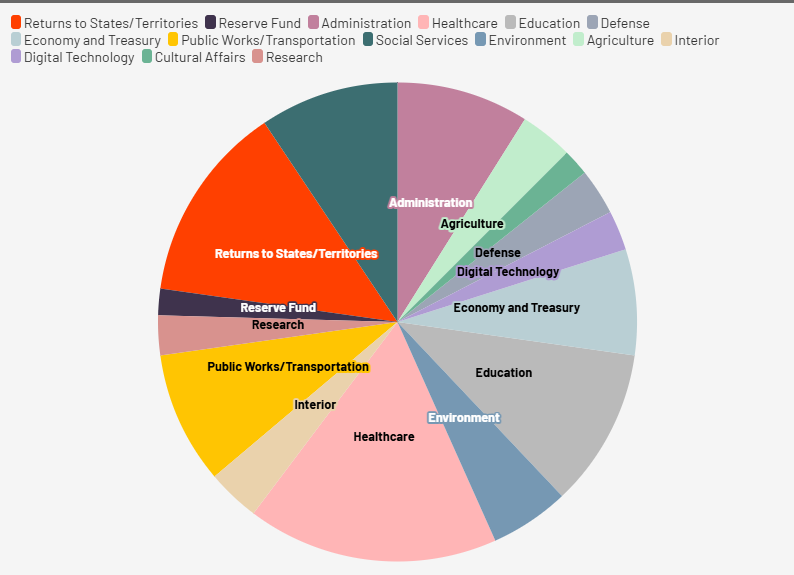
The Federation of Centrist Democrats initially sought tax incentives for private-sector-led infrastructure projects, while the PAP and SDP advocated for direct federal investments. The final compromise includes a mix of public-private partnerships (PPPs) and direct funding for key infrastructure projects.
One of the more hotly debated topics was defense spending. While the FCD successfully negotiated a reduction from 5% to 3.5% of the total budget, PAP members pushed for increased cybersecurity measures and modernization of the armed forces. The final agreement allocates €114.7 billion toward national defense, with a strong focus on cybersecurity initiatives, counterterrorism efforts, and military equipment modernization. Minister of Defense German Molinero (FCD) assured that despite the reduction, the budget would still maintain military readiness and security. "We are focusing on efficiency and modernization, not just spending for the sake of spending," Molinero stated.
As the budget reaches its finalization stage, political analysts speculate on the long-term implications for the coalition government. Meanwhile, public opinion remains divided along key demographic lines. Younger voters, particularly those under 35, have shown strong support for the budget's investments in education, childcare, and digital infrastructure, seeing them as crucial for future job opportunities and economic mobility. However, older voters have expressed concerns over potential tax burdens and the shifting priorities in defense spending, favoring a more conservative approach to fiscal policy. Meanwhile, key opposition leaders have voiced their concerns, further intensifying the national debate. The compromises struck between the PAP, SDP, and FCD demonstrate the challenges of governing a diverse coalition, but also underline their commitment to stability. However, opposition parties, including the Conservative Reformist Party (CRP) and Alternative for Leagio (AfL), have criticized the budget. CRP leader George Wallace argued that "this budget irresponsibly expands government intervention without securing sustainable economic growth. Instead of encouraging fiscal prudence, it shifts the burden to future generations." Similarly, AfL National Party Leader Alice Wazemen contended that "the reduction in defense spending is a direct threat to national security. While cybersecurity is important, we must not neglect conventional military readiness."
In addition, economic analysts and policy experts have weighed in on the broader implications of the budget. Dr. Leonard Callahan, an economist at the Leagio Institute for Policy Studies, stated: "This budget strikes a balance between progressive expansion and economic stability, but its success will depend heavily on how effectively the government can implement new policies without creating excessive bureaucratic hurdles."
Meanwhile, labor unions and business leaders have also expressed mixed reactions. The National Federation of Workers has praised the government's investments in healthcare and education, arguing that these measures will create long-term job security and wage growth. However, the Leagioan Chamber of Commerce has raised concerns about the impact of new local governance policies on businesses, warning that uneven regional implementation could lead to discrepancies in tax rates and regulatory policies across different counties. A recent Tullion Public Affairs Poll indicated that 56% of respondents support increased social spending, while 42% expressed concerns over the budget's decentralization approach. Urban respondents largely favored expanded social services and healthcare investments, while rural respondents emphasized local governance empowerment and infrastructure improvements., arguing that it expands government intervention while failing to sufficiently address national security and economic competitiveness. The public response has been mixed, with supporters praising investments in social services and infrastructure, while critics express concerns over potential inefficiencies in decentralization efforts.
Political expert Dr. Amelia Verdoux commented: "This budget is a test of the coalition’s ability to govern effectively. While it represents a broad compromise, the true challenge will be in implementation and ensuring that the policies deliver tangible benefits."
The 2025-2026 budget agreement, while marking a milestone for the coalition government, remains a delicate balancing act between progressive social policies, economic liberalism, and fiscal decentralization. The final draft is expected to be approved by the National Congress in the coming weeks, setting the stage for a pivotal year in Leagioan governance.
With both supporters and critics watching closely, the success of this budget will determine not only the coalition’s stability but also the broader direction of Leagioan policy in the years ahead.
-
-

United Peoples Front Announces Major Reorganization Following 2024 Electoral Setbacks
In response to the significant losses suffered in the 2024 House of Councilors elections, the United Peoples Front (UPF) has announced a sweeping reorganization aimed at revitalizing the alliance and strengthening its electoral prospects for the 2026 Senate Midterms and 2028 House Elections. With James Moriarty remaining at the helm as UPF President and a key figure in the Senate, the coalition is undergoing structural changes to improve its electoral strategy, party coordination, and grassroots engagement.
To streamline decision-making and improve coordination among its member parties, the UPF has formalized an Executive Committee that will oversee party strategy, election planning, and policy direction. The committee will be composed of:
-
James Moriarty (UPF President, Senator)
-
Elena Vasquez (Leader of the Socialist Union Party, SUP)
-
Dario Antonelli (Leader of the Green Party, GP)
-
Marcus Trenton (Acting Leader of the Socialist Workers Party, SWP)
-
Isabelle Fontaine (Strategy Director)
-
Nathaniel Clark (Campaign Coordinator)
-
Sofia Nguyen (Regional Organizing Director for Western Provinces)
-
Victor Alvarez (Regional Organizing Director for Eastern Provinces)
-
Yoruichi Shihōin (Director of Policy and Marketing)
The Executive Committee will meet biweekly to address key legislative and campaign efforts, ensuring a unified front in policy and messaging.
Elena Vasquez emphasized the importance of this restructuring, stating, “We must rebuild our connection with the working class and ensure that the UPF represents the needs of everyday people. This reorganization allows us to be more agile, responsive, and proactive in the fight for economic justice.”
Dario Antonelli added, “The Green Party remains committed to an eco-socialist future, and with this new leadership structure, we can better integrate climate justice into all aspects of UPF policy.”
Recognizing the loss of voter enthusiasm in key districts, the UPF has committed to a major expansion of its local and grassroots presence:
-
Creation of UPF Regional Offices in each province to coordinate volunteer efforts, voter outreach, and local activism.
-
Union and Labor Alliances: The UPF will deepen its connections with major labor unions, worker cooperatives, and tenant rights organizations to re-engage working-class voters.
-
Student & Youth Outreach: Establishment of UPF Student Chapters at universities and technical schools to build support among young progressives.
-
Community-Based Initiatives: Investment in food security programs, eviction defense networks, and mutual aid projects to showcase the UPF’s commitment to working-class communities.
The UPF is shifting its focus to strategic Senate and House district targeting, aiming to recover lost ground in the House while expanding its foothold in the Senate.
-
2026 Senate Midterms: The UPF will prioritize progressive-leaning and battleground provinces, identifying districts where former UPF voters shifted to the PAP and where right-wing parties remain vulnerable.
-
2028 House of Councilors Elections: A new Candidate Development Program will focus on recruiting a mix of pragmatic and radical candidates tailored to their respective districts. Swing districts will see moderate social democrats, while strongholds for radical leftism will get SWP and eco-socialist candidates.
-
Local Elections Focus (2026-2027): The UPF will contest more state and municipal elections, aiming to build local political infrastructure before the next national race.
At the heart of the UPF’s reorganization is the People’s Contract, a comprehensive policy agenda designed to make socialist policies more accessible and winnable. The contract focuses on key legislative priorities that directly impact working-class Leagioans, emphasizing practical solutions over ideological rhetoric.
-
Economic Democracy – Support for worker-owned cooperatives, fair wages, and progressive taxation to reduce wealth inequality.
-
Housing Justice – Enact strong rent controls, eviction protections, and a large-scale public housing expansion to combat the affordability crisis.
-
Green Economy Transition – Prioritize publicly funded renewable energy projects, eco-socialist job programs, and climate-focused infrastructure investment.
-
Healthcare Expansion – Strengthening public healthcare options within the multi-payer system, ensuring universal access to essential medical services.
-
Labor Rights – Reinforce union power and workplace protections, including higher wages, shorter workweeks, and protections against corporate abuses.
-
Education and Youth Rights – Implement free public university tuition, student loan forgiveness programs, and expanded early childhood education.
-
Democratic Reform – Push for ranked-choice voting, anti-corruption measures, and a ban on corporate lobbying to ensure a fair political system.
The People’s Contract represents a bridge between radical transformation and achievable policy goals, ensuring that voters see the UPF as a viable alternative to centrist governance.
However, not all responses to the reorganization have been positive. The Progressive Alliance Party (PAP) dismissed the UPF’s restructuring as "a desperate attempt to stay relevant after voters rejected their out-of-touch policies." Meanwhile, conservative parties have accused the UPF of continuing to push a "reckless, socialist agenda that will destabilize the economy." In response, James Moriarty stated, “We are not here to please the establishment. We are here to fight for the working people of Leagio, and we will not apologize for that.”
With the SWP completely wiped out electorally, the party is launching a survival and resurgence strategy:
-
Rebuilding as a grassroots activist organization, focusing on labor organizing, direct action, and tenant defense campaigns.
-
Running candidates in municipal and state elections to rebuild credibility before attempting a national comeback.
-
Pushing for a stronger leftist voice within the UPF, advocating for bolder economic policies and direct worker control initiatives.
-
Student and Youth Radicalization Efforts, ensuring the next generation of socialists is engaged politically.
To compete with the PAP’s media presence, the UPF is launching a Digital Strategy Initiative, including:
-
A dedicated UPF Social Media Team to boost engagement.
-
A Rapid Response Media Unit to counter corporate media attacks and right-wing narratives.
-
Online fundraising and small-donor campaigns to expand the party’s financial independence.
The United Peoples Front’s 2025 reorganization is designed to correct past mistakes, rebuild lost voter trust, and position itself for a strong comeback in 2026 and 2028. With a revitalized leadership structure, expanded grassroots operations, and a clearer policy vision, the UPF aims to solidify its role as the leading leftist force in Leagioan politics.
“We will not retreat from our vision of a just, green, and worker-led Leagio,” Moriarty declared in a recent press statement. “This is a moment of renewal. We are here to win.”
-
-

National Congress Passes Historic County Governance Act Alongside FY25-26 Budget
In a landmark moment for local democracy and administrative reform, the National Congress of the Commonwealth of Leagio voted overwhelmingly on Thursday to pass the long-awaited County and Local Governance Act of 2025, marking one of the most significant overhauls of Leagio’s domestic governance structure since the 2020 Constitution.
The legislation passed with strong majorities in both chambers—347 AYE out of 531 votes in the House of Councilors and 80 out of 129 in the Senate—cementing its place in national law after months of debate, negotiations, and coalition compromise. On the same day, Congress also approved the 2025–2026 national budget, which includes specific allocations to fund the rollout of the new county governance system across the nation’s states and territories. The bill is expected to be signed into law by President Mouri-Kudo later this week, with implementation beginning immediately in preparation for the 2025 state and local elections.
The County and Local Governance Act of 2025 establishes a comprehensive framework for county councils, empowering regions to directly elect representatives responsible for local infrastructure, law enforcement, education, and rural development. The Act also introduces Special Administrative Counties (SACs) for urban areas, allowing them to merge city and county governance into a single structure. Each county will have a Council of Deputies proportionally sized based on population, with over 3,600 county council seats created nationwide. In conjunction with the newly adjusted 21,550 municipal seats, Leagio will now have a total of 25,199 locally elected officials, ensuring representation that balances both rural and urban needs.
According to the Ministry of Finance, the funding from the recently passed budget ensures that all 144 counties will be operational in time for the next electoral cycle, which includes state, municipal, and now county council elections in Fall 2025. The act’s passage is a victory for the ruling coalition, comprised of the Progressive Alliance Party (PAP), Social Democratic Party (SDP), and the Federation of Centrist Democrats (FCD). Despite some opposition from nationalist and far-left parties, the coalition secured support across the aisle, including from a faction of the Civil Populist Party (CPP).
Speaking from the Presidential Office in Tullion, Prime Minister Lahaye praised the outcome: “This is a leap forward for regional democracy and for the unity of our republic. Counties will no longer be simply lines on a map, but engines of development and citizen-driven leadership.”
The Ministry of the Interior is expected to release an official map of final county boundaries within the next month. County Council elections are scheduled to take place in tandem with state and municipal elections in Fall 2025, giving Leagioans the opportunity to vote at all levels of local government in a single coordinated cycle. Many political parties have already begun preparing local campaign structures in anticipation of this historic vote.